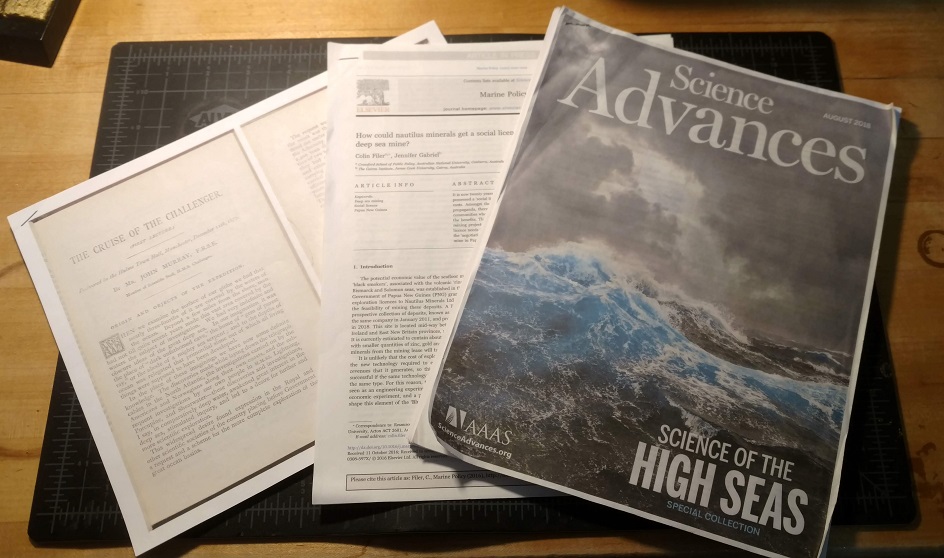Deep-sea mining, as both an industry and community of practice, is highly engaged in the scientific process. From plume flow models to environmental baselines to new engineering advancements, much of the core discussions happening in deep sea mining happens within the scientific literature. This is incredibly valuable when it comes to fostering partnerships and collaborations between science, industry, and policymakers, while vetting new research through peer-review, but it presents one major challenge: not everyone can access scientific literature.
Stakeholders, particularly those in small-island developing states where new mining prospects are being proposed, rarely have access to the full breadth of the scientific literature. University and institutional libraries pay, in many cases, hundreds of thousands of dollars to maintain journal subscriptions. Without a subscription, a single paper can cost the reader $35 USD and to fully engage with the depth of mining literature, new stakeholders need to work through a 50-year backlog of studies, policy recommendations, and technical papers.
To add insult to industry, the papers’ authors don’t see a dime of either subscription or one-time article fees, all proceeds go to the publisher. This is a large reason why there has been a strong push towards open access models—publishing models in which access to the finish manuscript is available for free—from many funding agencies over the last decade. Though the EU is mounting a major effort to make all publicly funding European research open access by 2020, today many research papers are still locked behind a paywall.
So how does a stakeholder worried about the environmental impact of a new mining venture, or interested in the policy framework surrounding resource extraction in the high seas, or doing due diligence background research into a new mining venture access the literature?
1. Search directly for the PDF.
While scientific journals will often put papers behind a paywall, almost all journal agreements allow the authors to host a copy (sometimes as an unformatted proof, which contains the same information but hasn’t been typeset to the journal’s format) on their personal website or on hosting platforms like ResearchGate. Searching for the paper’s title, in quotation marks, followed by “.pdf” will usually turn up those copies if they are available. You can also use the Unpaywall Google Chrome Plugin, which will find those copies for you and make it easy to access with a single click.
2. Email the corresponding author.
It’s quite surprising how few people directly email the corresponding author for a copy of their paper. Every modern paper lists the email of at least one author who has agreed to take responsibility for correspondences regarding the study. They are usually more than happy to send a copy. Emailing the author is doubly advantageous as they can also direct you to more recent of related studies. Unfortunately, this route may not be particularly quick. They may be on vacation, on a research expedition, or caught up in the longest government shutdown in the history of the United States and unable to access their government email account. And, of course, this doesn’t worked for older papers where the authors have either retired or passed away.
3. The other routes.
When all else fails, there are other, more arcane routes to accessing a paper, some of which, though long established, may not be legal depending on the copyright laws and treaties of your home institution’s country.
Perhaps the most common is to simply ask an academic colleague with access to find the paper for you. While a paper’s author is generally permitted to share anything they’ve published, a third party unconnected with the paper is not given that same leeway. Nevertheless, a quick “hey, can you grab this paper for me?” is by far the most common way to access a paper locked behind a paywall. The final (and least recommended) route is the look for the paper on Sci-Hub. Sci-Hub is a digital archive of all peer-reviewed papers, made available without paywalls. It is, however, not legal to access in many countries because it violates publishers copyright and should generally be avoided. This (thankfully open access) paper breaks down what Sci-Hub is and how it works.
Having access to the full breadth of scientific knowledge surrounding deep-sea mining is essential for policy-makers and stakeholders to develop policy based on the best-available data. Fortunately, more and more papers are being published Open Access, especially those with broad international relevance. But unless Open Access becomes ubiquitous, stakeholders without institutional connections will have to navigate the maze of guidelines limiting who has access and how a paper can be shared.

